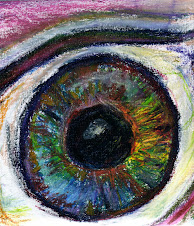If you stare in front of you at a small visual target like a sticker or a spot on the wall you are using your central vision. The longer you maintain that fixation, the more you should become aware that you can also see objects in your peripheral field of vision. The ability to coordinate between your central and peripheral visual systems is very important. Athletes depend on it to sense when an opponent is approaching from behind. Everyone relies on it to remain aware of cars or other potentially dangerous obstacles that should be avoided. Peripheral awareness can actually be improved with practice and certain activities.
For individuals on the Autism Spectrum, however, coordinating and transitioning between the central and peripheral visual fields may be their most significant visual challenge. Many people on the Autism Spectrum repeatedly focus on spinning objects, or on moving lights and shadows. These are enjoyed via the peripheral system. Other people on the spectrum fixate on a pen or pencil that they hold and rotate right in front of their eyes or they cannot be pulled away from small objects or details. These are enjoyed via the central visual system.
As Patricia S. Lemer explains in her helpful book, Envisioning a Bright Future: Interventions that Work for Children and Adults with Autism Spectrum Disorders, learning to coordinate central and peripheral vision may improve a child's attention, focusing, and visual perceptual skills. It may even reduce toe walking and the need to hold onto a wall when walking. Dr. Melvin Kaplan (www.autisticvision.com) wrote a book, Seeing with New Eyes, that explains how these issues can be addressed using therapeutic prisms.
Children who are on the Autism Spectrum may have other visual challenges that can be addressed with the help of a developmental optometrist and a program of in-office vision therapy. They may need glasses to see clearly. You can easily locate an experienced developmental optometrist in your area by plugging your zip code into the search box at www.covd.org. Even if your child is not on the Autism Spectrum, it is important to schedule an annual eye exam with a developmental optometrist and to follow up with the treatment, prescriptions, or therapy that the doctor advises.
Friday, September 25, 2009
Peripheral Awareness & Autism Spectrum Disorders
Subscribe to:
Post Comments (Atom)





No comments:
Post a Comment